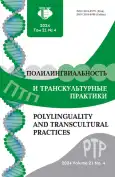English in the EU: Before and After Brexit
- Autores: Marusenko M.A.1, Marusenko N.M.1
-
Afiliações:
- St. Petersburg State University
- Edição: Volume 21, Nº 4 (2024)
- Páginas: 641-657
- Seção: Language in System
- URL: https://journal-vniispk.ru/2618-897X/article/view/326888
- DOI: https://doi.org/10.22363/2618-897X-2024-21-4-641-657
- EDN: https://elibrary.ru/DEWVEG
- ID: 326888
Citar
Texto integral
Resumo
The study discusses the prospects for maintaining English as the official and working language of the European Union after Brexit. Contrary to the hopes of some member states, the use of English is not decreasing, but, on the contrary, is constantly increasing. This is due to the emergence of a new variant of English, Euro-English, which, according to EU leaders, should become the common second language of Europeans, necessary for life in a single global village. Variants of English in the outer circle countries have, like variants from the inner circle countries, their own endonormative features, and lead to the abandonment of the mono-model approach focused on native speakers and to a polymodel concept. This dynamic polymodel also includes variants of English used in Western Europe as second languages by speakers who do not share a common first language. As a result of the United Kingdom’s withdrawal from the EU, the sociolinguistic space for the European variant(s) has even expanded because Britain is no longer the arbiter of correctness and the source of linguistic norm. Therefore, in post-Brexit Europe, a variant called Euro-English is being recognized. Although the United Kingdom officially left the EU on January 31, 2020, English remains the most used foreign language in the EU, thanks to the fact that over the past 20 years it has become the lingua franca for European institutions and speakers of other languages. Today, English is the official language of only two small EU member states (Ireland and Malta), where it has second language status after Gaelic and Maltese respectively. But these two countries have not declared English as their official language in the European Parliament, so today English has no legal basis to remain an official or working language of the EU. Although English no longer has the status of an official EU language after Brexit, it has strengthened its position by becoming the lingua franca of the European Union. The goal of the supranational European leadership is to make it the second language of all Europeans, essential for competitive life in a single global village.
Palavras-chave
Sobre autores
Mikhail Marusenko
St. Petersburg State University
Autor responsável pela correspondência
Email: mamikhail@yandex.ru
ORCID ID: 0000-0002-0441-7845
Doctor of Philological Sciences, Professor, Department of Computational Linguistics, Faculty of Philology
7/9 Universitetskaya nab., 199034, Saint Petersburg, Russian FederationNatalia Marusenko
St. Petersburg State University
Email: nmm.spb@gmail.com
ORCID ID: 0000-0002-3347-1373
Candidate of Philological Sciences, Associate Professor, Department of Computational Linguistics, Faculty of Philology
7/9 Universitetskaya nab., 199034, Saint Petersburg, Russian FederationBibliografia
- Kachru, B.B., ed. 1992. Teaching world Englishes. In The other tongue: English across cultures. 2nd ed. Urbana, IL: University of Illinois Press., p. 355–365.
- Kachru, B.B. 1986. The Alchemy of English: The Spread, Functions, and Models of Non-native Englishes. University of Illinois Press.
- Modiano, M. 2017. “English in a post-Brexit European Union.” World Englishes, vol. 36, no 3, pp. 313–327.
Arquivos suplementares









